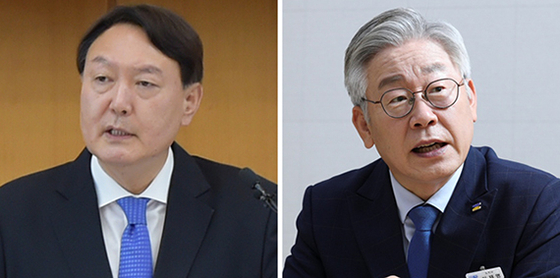
Seok-yeol Yoon, Jae-myeong Lee
In the new year, the results of the polls on the voters’ approval ratings of public opinion polls are fluctuating. The so-called ‘Third-Lean’ system of Democratic Party President Lee Nak-yeon, Gyeonggi Governor Lee Jae-myeong, and Prosecutor General Yoon Seok-yeol are clear, but the leaders are different depending on the investigating company. In particular, in the real meter survey released on the 3rd, Yun surpassed 30% for the first time.
Approval rates vary depending on the poll method
Seok-Yeol Yoon breaks 30% of ARS survey for the first time
YTN-Realmeter surveyed 1,000 men and women aged 18 and over nationwide (±3.1% points for a 95% confidence level of sample error), according to the results of a survey on the 1st to 2nd day, and the approval rate of President Yoon was 30.4%. It was 10.1 percentage points ahead of Governor Lee (20.3%), the second place, and a double score difference from the leader of the Democratic Party (15.0%) along with Nak-yeon Lee, the third place.
This was not a small difference from other polls published earlier. In KBS-Korea Research’s December 27-29 survey (1,000 men and women 18 years of age or older, ±3.1% points on the 95% confidence level of the sample error), Governor Lee was 21.7% and CEO Lee 16.9%. It was 13.8%, 7.9 percentage points behind this branch. In the SBS-Ipsos survey (December 28-30), Governor Lee took the lead with 23.6% of Governor Lee, 18.5% of President Yoon and 16.7% of CEO Lee.

The presidential election polls were mixed according to the survey method. Graphic = Reporter Jaemin Shin [email protected]
As such, in a total of 10 presidential candidate preference surveys conducted from December 27 to January 2, Governor Lee ranked first in seven surveys and President Yoon ranked first in three surveys.
It is interpreted that the differences in survey methods were largely attributable to the wide variation in opinion polls during the same period. In fact, all seven polls led by Lee Governor were interviewed by phone, and all three polls, headed by Mr. Yun, were automated response (ARS).
In particular, the YTN-Realmeter survey, where Yun’s approval rating exceeded 30%, was 100% ARS (wired 20%, wireless 80%), and the KBS-Korea Research survey, where Yun was ranked third, was 100% wireless telephone interview. Unlike telephone interviews, where the investigator randomly calls and interviews the respondents directly, ARS is an automatic answer, so there is no need to go through the surveyor.
An analysis suggests that Yoon’s strength in the ARS survey was due to the response of the supporters of’shy Yoon Seok-yeol’ who rarely reveal their conservative tendencies. Han Gyu-seop, a professor at Seoul National University’s Department of Media and Information Studies, explained, “Because the ARS survey did not go through an investigator, a large number of respondents were anti-moon jae-in. .
Even in the same ARS survey, it differs depending on whether it is a landline (home phone) or wireless (mobile phone). In the Daily-R&Search survey on December 27-29 conducted by 100% wireless ARS method (1038 people aged 18 or older, ±3.0% points on the 95% confidence level of the sample error), Yoon was 23.5%, but wired ARS was It exceeded 30% in the YTN-realmeter survey that reflected 20%. This is the reason for the diagnosis that “the wire survey with a high response rate for the elderly tends to be advantageous for conservative candidates.”
Professor Lee Jun-woong of the Department of Media and Information Studies at Seoul National University said, “It is difficult to conclude that it shows accurate public sentiment because there are large differences in respondents’ political tendencies, questionnaires, and respondent sampling depending on the survey company.”
Reporters Sohn Kook-hee and Kim Jun-young [email protected]
